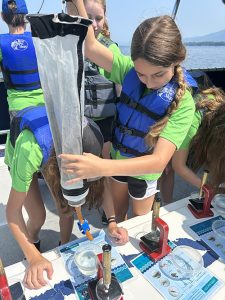By Hannah Hughes, Chronicle Summer Staff
Lake George Association‘s Floating Classroom is working hard to create the next generation of lake protectors through education, experimentation, and most importantly, connections to the environment.

“When you’re in a classroom you’re usually reading from a book or doing a lecture,” said Jaimi DeFeo, LGA’s Education for Action Manager.
“This is actually getting you into the field…It gives you another element, another dimension, in connecting to nature and connecting to the lake.”
The Floating Classrom, offered from May to Mid-October, includes a boat trip out on Lake George, doing experiments along the way that revolve around the science and ecology of the water.
Students, before their boat trip, even can explore and learn about Lake George’s watershed in a nearby stream.
“It’s been a success…people are coming back…We have school programs actually calling us now to book in the spring.” Mrs. DeFeo said.
“We were booked solid this spring and probably will be in the fall.”
Mrs. DeFeo says her favorite part is watching people have their “aha moments” — sudden realizations and connections that drive questions, which leads to problem-solving, which is an important part of the Floating Classroom’s mission of “science to solutions.”
“We want to make sure they are getting what’s happening on the lake…but we also want them to know what they can do about it,” said Mrs. DeFeo.
While on the boat, participants use a secchi disk to measure water clarity, catch and view phytoplankton and zooplankton under a microscope, and look at water temperatures.
On each tour an educator not only leads the experiments, but teaches about the history of Lake George, its formation, and other important knowledge.
Although the Floating Classroom is especially popular with schools and camps, they also have trips open to the public, making it accessible to everyone.
They also partner with scientists from The Jefferson Project, which has been collecting data about the lake for 10 years.
“It’s ‘the smartest lake in the world’ because we have so much going on, and so much data coming in from what they’ve done,” said Mrs. DeFeo.
The Floating Classroom does private “Bay by Bay” programs, talking with groups before going out onto specific bays to see the science up close.
Realizing these environmental connections is more important now than ever, especially now with problems on the horizon for Lake George.
“The biggest threat…is stormwater runoff, because stormwater runoff has billions of gallons coming into the lake, and it’s bringing nutrients with it, and pollution,” said Mrs. DeFeo.
She said that as storms intensify due to climate change, so does runoff, which is leading to harmful algal blooms forming in the lake. The LGA has been seeing them since 2020.
“That’s our next big challenge. Once they get in there, it’s hard to stop the harmful algal blooms. They’re not toxic yet, but that’s…one of the things that can start happening,” Mrs. DeFeo said.
She said that in order to better protect the lake, you need to learn about it first, which motivates Mrs. DeFeo.
“Letting people know everything’s connected, and it’s actually teaching the next generation…which is really important for us to start focusing on.”
Learn more about Lake George on the LGA website or via the Lake Protector app. Mrs. DeFeo says anyone interested in the Floating Classroom should come give it a try, and spread the word.
“We have a lot of outreach in different areas,” she said. “It’s really become part of the lake.”
Copyright © 2023 Lone Oak Publishing Co., Inc. All Rights Reserved
 Glens Falls Chronicle Serving the Glens Falls/Lake George region; Warren, Washington and northern Saratoga counties since 1980
Glens Falls Chronicle Serving the Glens Falls/Lake George region; Warren, Washington and northern Saratoga counties since 1980

